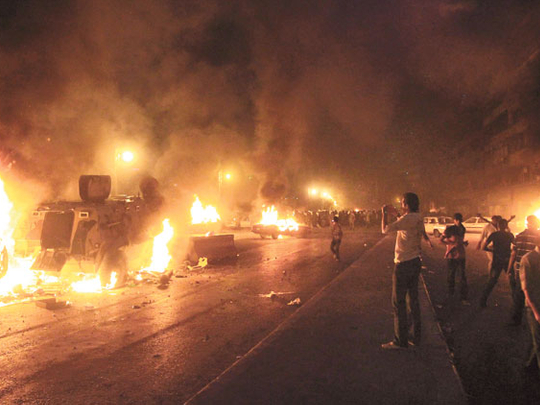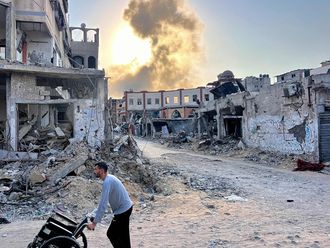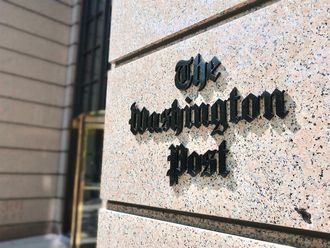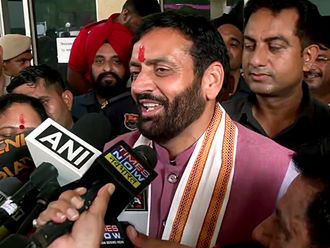
The worst thing that could befall Egypt today is division such as we are witnessing between the country's Coptic and Muslim citizens. Against the same cruel dictatorship they stood united in Liberation Square (Midan Al Tahrir) demanding that former president Hosni Mubarak leave and his regime be removed. For political revolution to be achieved in Egypt, unity between the two main religious traditions (and of course all other Egyptians with or without religious and spiritual affiliations) is basic and imperative. All belong to the same nation; they share the same history, memories, culture and hopes. As a human being and as a Muslim, I must begin by expressing my deepest condolences to the victims of the bereaved families and my sympathy for the wounded, women and men. These attacks against peaceful protesters must be condemned.
What happened and why did it happen now? On September 30, a church was burned down in Aswan. The act of arson followed a statement by the governor, Mustafa Al Sayyed, claiming the church had been built without a permit. Demonstrations began in Aswan; Coptic leaders then decided to demonstrate peacefully in Cairo to underline that the issue was one of gravest national interest: there will be no future for Egypt if manipulations that seek to divide Muslims and Christians are tolerated. Their action was a call for unity in reaction to an attempt to divide. Such attempts are nothing new: both former presidents Anwar Sadat and Mubarak used the same strategy again and again over the last 40 years to justify their policies of repression: a clash would be fomented following which they would send in the troops and arrest people claiming they were preserving national unity and security.
Egypt's national television covered the events in the usual old way (followed, interestingly, by Al Jazeera): they claimed that the Copts had been manipulated from abroad, and that the protesters had stolen weapons and started shooting at the army, which had no choice but to react. But many other reports and alternative media coverage are telling us another story. The peaceful protesters, arriving at Maspero, were first attacked by unknown stone throwers; then two armoured personnel carriers drove straight into the crowd of demonstrators. The scene was chaotic, as protesters tried to flee. About two dozen people were killed.
These events took place at a particularly sensitive moment and have clearly benefited the army. The Copt protesters got it right as they chanted: "The people want the removal of the Field Marshal" referring to Mohammad Hussain Tantawi, the head of Egypt's ruling military Council. The same slogan was used against Mubarak and now, again, against the head of the army by Copts and Muslims in their demonstrations over the last months. Elections have been postponed; behind-the-scenes bargaining is in progress to protect the supporters of Mubarak's regime (army officers and politicians); nothing is transparent. It was the right time to fabricate such an attack and to split Egyptian citizens along religious lines. The Supreme Council of the Armed Forces (Scaf) looms in the shadows; the methods are still the same. The Cairo massacre shows that the Egyptian army is still a powerful force, and much smarter than some have thought.
Calculated strategy
Its neutrality and peaceful attitude during the uprisings that began on January 25 was not a sign of support for citizens demanding justice and freedom. Beyond the divisions, and the different alliances within the armed forces, it was a calculated strategy of wait-and-see; a win-win situation. For Tantawi, the armed forces, as well as their domestic and foreign allies, Mubarak and the structure of the regime were not the point. They could well collapse and disappear while the army successfully continued to hold power. Over the last weeks the Scaf has been playing a very clever game, taking full advantage of all the potential divisions that afflict Egyptian civil society. The political parties are at odds, tensions between the secularists and the Islamists are permanent, and the absence of civil leadership is glaring: in these circumstances, the Scaf will contrive, one way or another, to protect its people and to gain decisive control over Egypt's political future. Democratic Egypt is indeed in danger.
What remains unclear is the nature of the relationship between the US (and the European countries) and the current military high command. US Secretary of State Hillary Clinton's statement is interesting, as it is implicitly accepting the official explanation: "the need [is] for the Egyptian government to ensure that the fundamental rights of all Egyptians are respected, including the rights of religious freedom, peaceful assembly ..." The ambivalent position of the US is an additional factor showing that the path towards freedom will be long and hard: complete and transparent democracy appears remote. The role of civil society (encompassing all the citizens and their institutions, of whatever background) is more critical than ever. It is time to set up new alliances, new dynamics, and new objectives that will unite all Egyptians. To call for more demonstrations in Midan Al Tahrir will not be enough. What is needed today is a broad, united, positive and articulated political vision — not a fragile, divided and emotional opposition.
Tariq Ramadan is Professor of Contemporary Islamic Studies in the Faculty of Oriental Studies at Oxford University and a visiting Professor at the Faculty of Islamic Studies in Qatar. His new book Islam and the Arab Awakening will be out in November.








